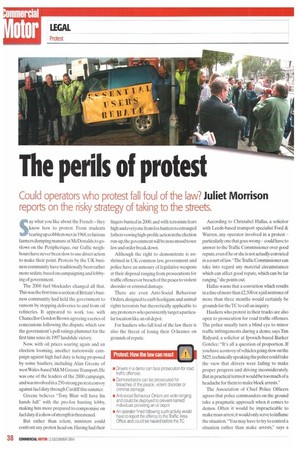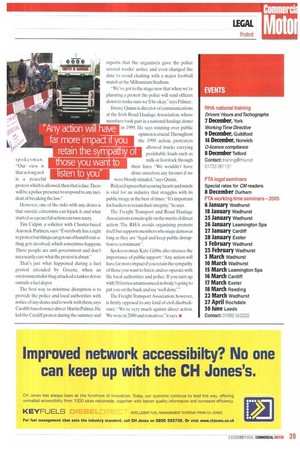The perils of protest
Page 38

Page 39

If you've noticed an error in this article please click here to report it so we can fix it.
Could operators who protest fall foul of the law? Juliet Morrison reports on the risky strategy of taking to the streets.
Say what you like about the French — they know how to protest. From students tearing up cobblestones in 1968,to furious farmers dumping manure at McDonalds, to goslows on the Peripherique, our Gallic neighbours have never been slow to use direct action to make their point. Protests by the UK business community have traditionally been rather more sedate,based on campaigning and lobbying of government.
The 2000 fuel blockades changed all that. This was the first time a section of Britain's business community had held the government to ransom by stopping deliveries to and from oil refineries. It appeared to work too. with Chancellor Gordon Brown agreeing a series of concessions following the dispute, which saw the government's poll ratings plummet for the first time since its 1997 landslide victory.
Now, with oil prices soaring again and an election looming, another nationwide campaign against high fuel duty is being proposed by some hauliers, including Alan Greene of west Wales-based M&M Greene Transport. He was one of the leaders of the 2000 campaign, and was involved in a 250-strong protest convoy against fuel duty through Cardiff this summer.
Greene believes "Tony Blair will have his hands full" with the pro-fox hunting lobby, making him more prepared to compromise on fuel duty if a show of strength is threatened.
But rather than relent, ministers could confront any protest head-on. Having had their fingers burned in 2000, and with terrorism fears high and everyone from fox hunters to estranged fathers vowing high-profile action in the election run-up, the government will be in no mood to see law and order break down.
Although the right to demonstrate is enshrined in UK common law, government and police have an arrnoury of legislative weapons at their disposal ranging from prosecutions for traffic offences or breach of the peace to violent disorder or criminal damage.
There are even Anti-Social Behaviour Orders, designed to curb hooligans and animal rights terrorists but theoretically applicable to any protesters who persistently target a particular location like an oil depot.
For hauliers who fall foul of the law there is also the threat of losing their 0-licence on grounds of repute. According to Christabel Hallas, a solicitor with Leeds-based transport specialist Ford & Warren, any operator involved in a protest — particularly one that goes wrong— could have to answer to the Traffic Commissioner over good repute, even if he or she is not actually convicted in a court of law. -The Traffic Commissioner can take into regard any material circumstances which can affect good repute, which can be far ranging," she points out.
Hallas warns that a conviction which results in a fine of more than 12,500 or a jail sentence of more than three months would certainly be grounds for the TC to call an inquiry.
Hauliers who protest in their trucks are also open to prosecution for road traffic offences. The police usually turn a blind eye to minor traffic infringements during a demo, says Tim Ridyard, a solicitor at Ipswich-based Barker Gotelee: "It's all a question of proportion. If you have a convoy of vehicles going slow on the M25,technicaLly speaking the police could take the view that drivers were failing to make proper progress and driving inconsiderately. But in practical terms it would be too much of a headache for them to make block arrests" The Association of Chief Police Officers agrees that police commanders on the ground take a pragmatic approach when it comes to demos. Often it would be impracticable to make mass arresLit would only serve to inflame the situation. "You may have to try to control a situation rather than make arrests," says a S pokesman. "Our view is that as long as it is a peaceful protest which is allowed, then that is fine.There will be a police presence to respond to any incident of breaking the law."
However, one of the risks with any demo is that outside extremists can hijack it, and what started as a peaceful action can turn nasty.
Tun Culpin, a solicitor with Chester-based Aaron & Partners, says: "Everybody has a right to protest but things can get out of hand if rent-athug gets involved, which sometimes happens. These people are anti-government and don't necessarily care what the protest is about."
That's just what happened during a fuel protest attended by Greene, when an environmentalist thug attacked a tanker driver outside a fuel depot.
The best way to minimise disruption is to provide the police and local authorities with notice of any demo and to work with them,says Cardiff-based owner-driver Martin Palmer. He led the Cardiff protest during the summer and
sten to you t ose you want to
reports that the organisers gave the police several weeks' notice and even changed the date to avoid clashing with a major football match at the Millennium Stadium.
"We've got to the stage now that when we're planning a protest the police will send officers down to make sure we'll be okay." says Palmer. Jimmy Quinn is director of communications at the Irish Road Haulage Association, whose members took part in a national haulage demo in 1999. He says winning over public opinion is crucial.Throughout the 1999 action, protesters allowed trucks carrying perishable loads such as milk or livestock through their lines. "We wouldn't have done ourselves any favours if we were bloody minded," says Quinn.
Ridyard agrees that securing hearts and minds is vital for an industry that struggles with its public image at the best of times. "It's important for hauliers to retain their integrity," he says The Freight Transport and Road Haulage Associations remain split on the merits of direct action. The RHA avoids organising protests itself but supports members who stage demos as long as they are "legal and keep public disruption to a minimum".
Spokeswoman Kate Gibbs also stresses the importance of public support: Any action will have far more impact if you retain the sympathy of those you want to listen. and co-operate with the local authorities and police. If you turn up with 50 lorries unannounced nobody's going to pat you on the back and say 'well done7 The Freight Transport Association, however, is firmly opposed to any kind of civil disobedience. "We're very much against direct action. We were in 2000 and remain so," it says. •




















































































































































































